共用题干
第二篇
Technological Utopia for Developing Countries
Cyberspace(网络空间),data superhighways, multi-media, the linking of computers, television and telephones will change our lives forever. Yet for all the talk of a forthcoming technological utopia(乌托邦),little attention has been given to the implications of these developments for the poor. As with all new high technology,the West concerns itself with the"how to benefit".The question of"for whom"is put aside once again.
Economists are only now realizing the full extent to which the communications revolution has affected the world economy.Information technology allows the extension of trade across geographical and industrial boundaries,and transnational corporations take full advantage of it. Terms of trade ex-change,interest rates and money movements are more important than the production of goods.The electronic economy made possible by information revolution.Technology allows the haves to increase their control on global markets and with destructive impact on the have-nots.
For them the result is instability. Developing countries which rely on the production of a small range of goods for export are made to feel like small parts in the international economic machine.As "futures"(期货)are traded on computer screens, developing countries simply have less and less control of their destinies.
So what are the options for regaining control?One alternative is for developing countries to buy in the latest computers and telecommunications themselves一so-called"development communications"modernization.Yet this leads to long-term dependency and perhaps permanent constraints on developing countries' economies.
Communications technology is generally exported from the U.S.,Europe or Japan.The patents, skills and ability to manufacture remain in the hands of a few industrialized countries.
Furthermore,when new technology is introduced,there is often too low a level of expertise to exploit native development.This means that while local elites,foreign communities and subsidiaries of transitional corporations may benefit,but not developing countries.
Why does the author say that the electronic economy may have a destructive impact on developing countries?
A:Because it enables the developed countries to control the international market.
B:Because it destroys the economic balance of the poor countries.
C:Because it violates the national boundaries of the poor countries.
D:Because it inhibits the industrial growth of developing countries.


 正确的诊断是
正确的诊断是 查看材料
查看材料

